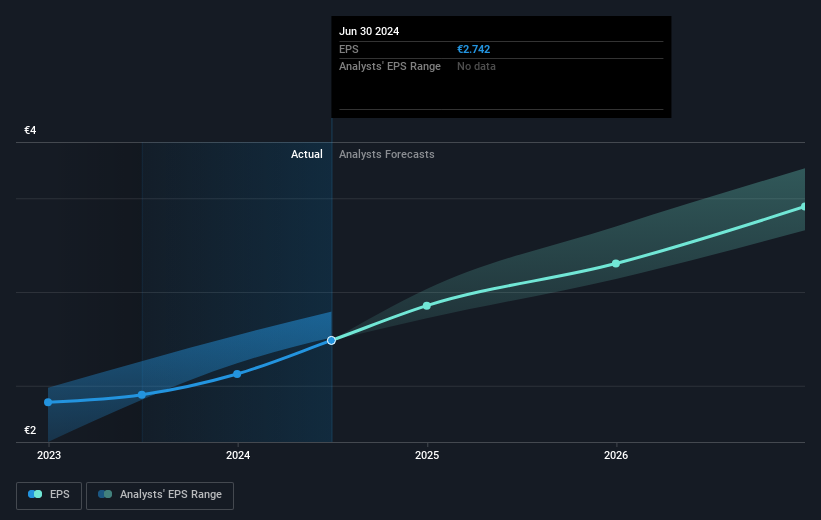- Spain
- /
- Auto Components
- /
- BME:CIE
CIE Automotive's (BME:CIE) 7.4% CAGR outpaced the company's earnings growth over the same five-year period

If you buy and hold a stock for many years, you'd hope to be making a profit. Furthermore, you'd generally like to see the share price rise faster than the market. But CIE Automotive, S.A. (BME:CIE) has fallen short of that second goal, with a share price rise of 26% over five years, which is below the market return. Zooming in, the stock is up just 3.0% in the last year.
The past week has proven to be lucrative for CIE Automotive investors, so let's see if fundamentals drove the company's five-year performance.
See our latest analysis for CIE Automotive
There is no denying that markets are sometimes efficient, but prices do not always reflect underlying business performance. One flawed but reasonable way to assess how sentiment around a company has changed is to compare the earnings per share (EPS) with the share price.
Over half a decade, CIE Automotive managed to grow its earnings per share at 11% a year. The EPS growth is more impressive than the yearly share price gain of 5% over the same period. Therefore, it seems the market has become relatively pessimistic about the company. The reasonably low P/E ratio of 9.63 also suggests market apprehension.
The image below shows how EPS has tracked over time (if you click on the image you can see greater detail).

We know that CIE Automotive has improved its bottom line lately, but is it going to grow revenue? You could check out this free report showing analyst revenue forecasts.
What About Dividends?
As well as measuring the share price return, investors should also consider the total shareholder return (TSR). The TSR is a return calculation that accounts for the value of cash dividends (assuming that any dividend received was reinvested) and the calculated value of any discounted capital raisings and spin-offs. It's fair to say that the TSR gives a more complete picture for stocks that pay a dividend. We note that for CIE Automotive the TSR over the last 5 years was 43%, which is better than the share price return mentioned above. And there's no prize for guessing that the dividend payments largely explain the divergence!
A Different Perspective
CIE Automotive shareholders gained a total return of 5.9% during the year. Unfortunately this falls short of the market return. If we look back over five years, the returns are even better, coming in at 7% per year for five years. Maybe the share price is just taking a breather while the business executes on its growth strategy. It's always interesting to track share price performance over the longer term. But to understand CIE Automotive better, we need to consider many other factors. Even so, be aware that CIE Automotive is showing 2 warning signs in our investment analysis , you should know about...
If you are like me, then you will not want to miss this free list of undervalued small caps that insiders are buying.
Please note, the market returns quoted in this article reflect the market weighted average returns of stocks that currently trade on Spanish exchanges.
New: AI Stock Screener & Alerts
Our new AI Stock Screener scans the market every day to uncover opportunities.
• Dividend Powerhouses (3%+ Yield)
• Undervalued Small Caps with Insider Buying
• High growth Tech and AI Companies
Or build your own from over 50 metrics.
Have feedback on this article? Concerned about the content? Get in touch with us directly. Alternatively, email editorial-team (at) simplywallst.com.
This article by Simply Wall St is general in nature. We provide commentary based on historical data and analyst forecasts only using an unbiased methodology and our articles are not intended to be financial advice. It does not constitute a recommendation to buy or sell any stock, and does not take account of your objectives, or your financial situation. We aim to bring you long-term focused analysis driven by fundamental data. Note that our analysis may not factor in the latest price-sensitive company announcements or qualitative material. Simply Wall St has no position in any stocks mentioned.
About BME:CIE
CIE Automotive
Designs, manufactures, and sells automotive components and sub-assemblies worldwide.
Flawless balance sheet, undervalued and pays a dividend.


